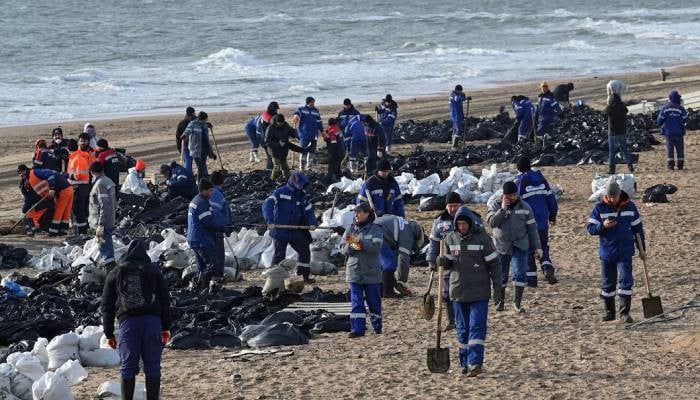62 Miles Of Black Sea Coastline Closed Due To Russian Oil Spill

Table of Contents
Extent of the Damage
Geographical Impact
The oil spill has affected a significant 62-mile stretch of the Black Sea coastline, impacting several crucial areas. Precise locations are still being determined, but initial reports indicate severe contamination in regions near [insert specific regions and potentially affected countries here – e.g., Anapa, Novorossiysk in Russia, and potentially neighboring countries depending on current information]. The spill's reach extends to ecologically sensitive areas including [insert specific ecologically sensitive areas, e.g., important breeding grounds for marine species, wetlands, etc.].
- Specific coastal areas affected: [List specific areas as they become available from reliable sources]
- Nearby towns and villages impacted: [List impacted towns and villages, linking to relevant news reports if possible]
- Visualizing the affected area: [Include a map if possible, clearly showing the affected 62-mile stretch and key areas.]
Volume of Spilled Oil
While the precise volume of spilled oil remains under investigation, initial estimates suggest [insert estimated volume and type of oil, citing sources]. The source of the spill is believed to be [insert source, e.g., a damaged pipeline, a tanker accident, etc., again citing sources]. This is a significant amount of [specify type of oil, e.g., crude oil, refined petroleum products], making the cleanup exceptionally challenging.
- Source of the oil: [Cite credible sources confirming the source of the spill]
- Types of oil spilled: [Specify the type(s) of oil spilled and their potential impacts]
- Comparison to other major oil spills: [Compare the scale of this spill to other notable spills to put its impact into perspective]
Immediate Environmental Consequences
The immediate consequences of the Russian oil spill are devastating. Reports indicate significant mortality among marine life, including [list specific affected species, e.g., fish, seabirds, marine mammals]. Coastal vegetation is also severely impacted, with [describe visible effects on coastal vegetation]. The long-term effects on the Black Sea ecosystem are likely to be profound.
- Observed dead marine animals: [Describe observed casualties and their species]
- Types of affected species: [List the range of marine species and bird life impacted]
- Impact on coastal vegetation: [Describe the visible damage to coastal plants and ecosystems]
Response and Cleanup Efforts
Government Response
The Russian government has initiated a response, deploying [mention specific response teams and equipment]. Cleanup efforts are underway using various methods, including [list cleanup methods, e.g., oil booms, skimmers, dispersants]. However, the scale of the disaster presents significant challenges. International cooperation is crucial, and [mention any signs of international collaboration if available].
- Emergency response teams deployed: [Detail the composition and scale of response teams]
- Cleanup methods employed: [Describe techniques used for containing and removing spilled oil]
- International cooperation: [Describe the involvement and support from other nations]
Challenges in Cleanup
The cleanup operation faces substantial obstacles. [Explain the challenges, e.g., harsh weather conditions, difficult terrain, limited resources, and the technical difficulties of removing oil from a vast and dynamic marine environment]. The sheer size of the affected area and the inaccessibility of certain regions complicate the efforts considerably.
- Weather conditions hindering cleanup: [Describe how weather impacts the cleanup process]
- Difficult terrain: [Explain how geographical features hinder cleanup operations]
- Limited resources: [Highlight the limitations in equipment, personnel, and funding]
- Technical challenges: [Explain the technical difficulties associated with oil spill cleanup in marine environments]
Long-Term Cleanup Strategy
A comprehensive long-term strategy is crucial for the remediation of the affected area and ecological restoration. This will likely involve [outline the long-term plan, e.g., continuous monitoring, habitat rehabilitation, and a long-term assessment of the ecological impacts]. The recovery process will take years, and ongoing monitoring is essential.
- Monitoring of the affected area: [Explain how the affected area will be monitored]
- Rehabilitation of habitats: [Describe plans for the restoration of damaged ecosystems]
- Assessment of long-term ecological impacts: [Explain how the long-term impact will be assessed]
Economic and Social Impacts
Impact on Fishing and Tourism
The oil spill has had a devastating impact on local economies. Fishing restrictions are in place, resulting in significant losses for local fishing communities. The closure of the coastline also impacts the tourism sector, causing [describe the economic consequences, e.g., cancellation of bookings, loss of revenue, potential job losses].
- Estimated financial losses: [Provide estimates of the financial losses in the fishing and tourism sectors]
- Impact on local communities: [Describe the social and economic impact on local communities dependent on these sectors]
- Potential job losses: [Estimate the potential number of jobs at risk]
Public Health Concerns
The oil spill poses significant public health risks. Oil contamination of water sources can lead to [describe potential health risks, e.g., waterborne diseases]. Air pollution from the oil spill may also cause respiratory problems. Authorities are advising the public to [mention safety precautions recommended to the public].
- Water contamination: [Discuss the potential for water contamination and its health risks]
- Air pollution: [Discuss the potential for air pollution and its health risks]
- Potential health effects: [List potential health impacts for humans and animals]
- Safety precautions advised to the public: [List recommended safety precautions]
International Response and Accountability
International Condemnation
The Russian oil spill has drawn international condemnation. [Mention statements from international organizations, e.g., the UN, EU, etc., expressing concern and demanding accountability]. International pressure is mounting for a thorough investigation into the incident and swift action to mitigate its consequences.
- UN statements: [Cite relevant statements from the United Nations]
- EU responses: [Cite relevant statements and actions from the European Union]
- Calls for investigation and accountability: [Summarize international calls for investigation and accountability]
Legal Ramifications
The legal ramifications of this spill are significant. Investigations are underway to determine responsibility and potential legal action. International environmental laws and regulations will play a crucial role in determining the legal consequences for those responsible for the spill.
- Investigations underway: [Mention ongoing investigations and their purpose]
- Potential fines: [Discuss potential fines and other legal penalties]
- International legal frameworks: [Mention relevant international environmental laws and conventions]
Conclusion
The massive Russian oil spill in the Black Sea represents a significant environmental disaster, causing widespread damage across 62 miles of coastline and threatening the unique Black Sea ecosystem. The cleanup efforts face numerous challenges, and the long-term ecological and socio-economic consequences remain to be fully assessed. The severity of the situation necessitates international cooperation and accountability. This devastating Russian oil spill underscores the urgent need for stricter regulations, enhanced preventative measures, and improved response capabilities to avoid similar environmental catastrophes in the future. We must demand accountability for this environmental crime and work together to protect the Black Sea and its precious ecosystems from further harm. Learn more about the ongoing impact of this Russian oil spill and how you can contribute to environmental protection efforts.

Featured Posts
-
 Analyse Du Document Amf Cp 2025 E1029768 D Ubisoft Entertainment
Apr 30, 2025
Analyse Du Document Amf Cp 2025 E1029768 D Ubisoft Entertainment
Apr 30, 2025 -
 Kamala Harris Broadway Speech A Word Salad
Apr 30, 2025
Kamala Harris Broadway Speech A Word Salad
Apr 30, 2025 -
 Predict The Winner Eurovision 2025 Betting Guide
Apr 30, 2025
Predict The Winner Eurovision 2025 Betting Guide
Apr 30, 2025 -
 Becciu Chat Segrete E Accuse Al Vaticano Il Cardinale Parla Di Complotto
Apr 30, 2025
Becciu Chat Segrete E Accuse Al Vaticano Il Cardinale Parla Di Complotto
Apr 30, 2025 -
 Challenges And Triumphs Amanda Owens Farm Life Story
Apr 30, 2025
Challenges And Triumphs Amanda Owens Farm Life Story
Apr 30, 2025
